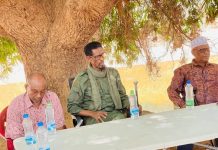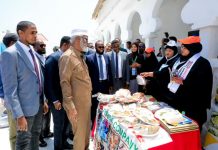
The Sudanese government and a major opposition group in the southern mountains of Nuba on Sunday signed a document paving the way for a final agreement, giving all people freedom of worship and separating religion and government.
The signing is seen as an important step in the power-sharing efforts of the government led by General Abdel Fattah al-Burhan to reach an agreement with the country’s various opposition groups.
Last year, Sudan signed agreements with a number of groups, including the Western Darfur regional group.
But the main group of the Sudan People’s Liberation Movement (SPLM-N) in the north, led by Abdelaziz al-Hilu, did not join the agreement, insisting on Sudan’s abolition of Islamic law and becoming a secular state and democratic nation.
Islamic law was enacted in Sudan in 1983, and was followed by ousted President Omar al-Bashir, who seized power in a coup. The so-called ‘Declaration of Principles’ was signed on Sunday in the South Sudanese capital by Sudan and the SPLM-N, which means talks to reach a full agreement can now begin.
The statement said the two sides agreed to “establish a civilian, democratic and federal state in Sudan, where freedom of religion, freedom of religion, and the practice of religion and worship are guaranteed to all Sudanese people, with the removal of the government.” cultural, racial and religious identities.”
“No one will be forced to practice religion, and the government will not have a formal religion,” The statement said, without specifying whether Sudan would become a secular state.
Aman Amum, secretary general of the SPLM-N, said an understanding on the role of religion in Sudan would facilitate negotiations for a full agreement. Sudan has now “agreed to separate religion and government,” He said.
It is unclear whether the Sudanese military, which shares power with the civilian government will support the move after years of Islamist support.
The SPLM-N operates in a Christian minority region and followers of other African faiths, who have for years complained of abuses against al-Bashir’s rule.
BY OSMAN HUSSEIN ALI











